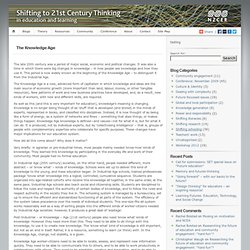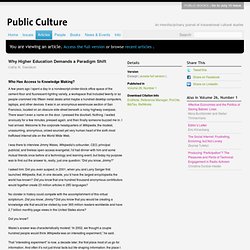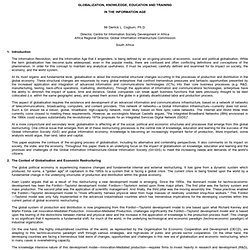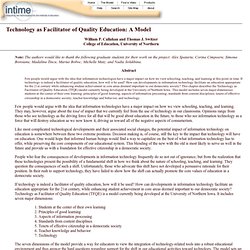

Education and Workforce Policy for the Future. Shifting to 21st Century Thinking » The Knowledge Age. The late 20th century was a period of major social, economic and political changes.

It was also a time in which there were big changes in knowledge – in how people see knowledge and how they use it. This period is now widely known as the beginning of the Knowledge Age – to distinguish it from the Industrial Age. The Knowledge Age is a new, advanced form of capitalism in which knowledge and ideas are the main source of economic growth (more important than land, labour, money, or other ‘tangible resources).
New patterns of work and new business practices have developed, and, as a result, new kinds of workers, with new and different skills, are required. As well as this (and this is very important for education), knowledge’s meaning is changing. How did all this come about? Very briefly: in agrarian or pre-industrial times, most people mainly needed ‘know-how’ kinds of knowledge. Post-Industrial – or Knowledge – Age (21st century) people also need ‘know what’ kinds of knowledge. “Why Higher Education Demands a Paradigm Shift” in Volume 26, Number 1. Cathy N.

Davidson Who Has Access to Knowledge Making? A few years ago I spent a day in a nondescript cinder-block office space of the cement-floor and fluorescent-lighting variety, a workspace that included twenty or so people crammed into fifteen metal desks amid maybe a hundred desktop computers, laptops, and other devices. It was in an anonymous warehouse section of San Francisco, located on an obscure side street beneath a noisy highway overpass. There wasn’t even a name on the door. I was there to interview Jimmy Wales, Wikipedia’s cofounder, CEO, principal publicist, and tireless open-access evangelist. I asked him: Did you even suspect, in 2001, when you and Larry Sanger first launched Wikipedia, that, in one decade, you’d have the largest encyclopedia the world has known? No cloister in history could compete with the accomplishment of this virtual scriptorium.
Did you know? That “interesting experiment” is now, a decade later, the first place most of us go for information. Notes. GLOBALIZATION, KNOWLEDGE, EDUCATION AND TRAINING. Mr Derrick L.

Cogburn, Ph.D. Director, Centre for Information Society Development in Africa Africa Regional Director, Global Information Infrastructure Commission South Africa Introduction The Information Revolution, and the Information Age that it engenders, is being defined by an on-going process of economic, social and political globalisation. At its most organic and fundamental level, globalisation is about the monumental structural changes occurring in the processes of production and distribution in the global economy. IN TIME: About: History. Note: The authors would like to thank the following graduate students for their work on the project: Alex Spatariu; Corina Cimpoeru; Simona Boroianu; Madalina Tincu; Marius Boboc; Michelle Matz; and Nadia Solukhina.

Abstract Few people would argue with the idea that information technologies have a major impact on how we view schooling, teaching, and learning at this point in time. If technology is indeed a facilitator of quality education, how will it be used? How can developments in information technology facilitate an education appropriate for the 21st century while enhancing student achievement in core areas deemed important to our democratic society? This chapter describes the Technology as Facilitator of Quality Education (TFQE) model currently being developed at the University of Northern Iowa. Few people would argue with the idea that information technologies have a major impact on how we view schooling, teaching, and learning. 1. Students at the Center of Their Own Learning 1. 1.